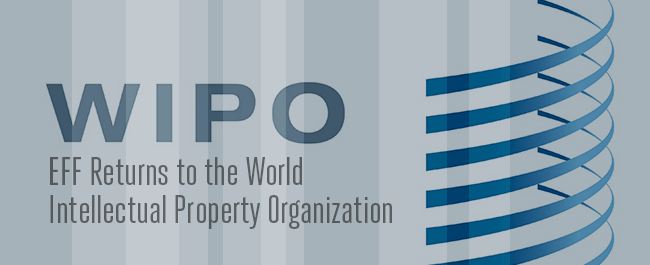“It is disturbing to learn that African governments support copyright exceptions”, said author Elinor Sisulu, in a pamphlet distributed by the International Authors' Forum to delegates at the World Intellectual Property Organization (WIPO) in Geneva this week. At a side event organized by IFFRO (the International Federation of Reproduction Rights Organizations) on Tuesday, Katie Webb, Administrator of the Forum, painted a dire picture of authors living below the poverty line and laid the blame squarely upon the copyright exceptions used by libraries and educational institutions. Canada was singled out for particular criticism for having broadened educational exceptions in 2012, leading to a reduction in royalties paid to a monopoly collecting society.
The preceding evening, the British and Australian delegations, sparing no expense, had chauffeured delegates to a cocktail dinner and private screening of an independent film, The Railway Man. As delegates wiped away tears during closing credits of the emotionally charged film, the British Ambassador to the UN Mark Matthews clapped the film's producer on the back and averred with passion, “This is why we need copyright!”
So later in the week, when WIPO's Standing Committee on Copyright and Related Rights (SCCR) came to consider proposals for new instruments for global minimum copyright limitations and exceptions, the environment was not exactly neutral.
The issue of limitations and exceptions to copyright has been on the agenda of the SCCR since its 12th session in 2004. The first set of beneficiaries of limitations and exceptions to receive attention were blind and visually impaired users, ultimately resulting in the landmark adoption of the Marrakesh Treaty to Facilitate Access to Published Works for Persons Who Are Blind, Visually Impaired or Otherwise Print Disabled in 2013. Following this, libraries and archives are considered to be next in line.
Standing most strongly behind the push for more comprehensive instruments on copyright limitations and exceptions are two groupings of countries, the African group and the GRULAC group of Latin American and Caribbean States. The African group has tabled a detailed draft instrument on limitations and exceptions for libraries which draws on original work by the International Federation of Library Associations and Institutions (IFLA), the International Council on Archives (ICA), Electronic Information for Libraries (EIFL) and Corporación Innovarte.
Lined up against them are the United States, Europe, and other developed countries, which form part of a faction called “Group B” at WIPO. Within that faction, the United States and Europe have come to play something of a “good cop, bad cop” routine, with Europe taking a hard line against user rights in copyright (partly because it doesn't want WIPO to preempt Europe's review of its own copyright regime currently underway), and the United States offering compromise.
The form of the compromise that the US has in mind is agreement on a set of soft law “objectives and principles” on exceptions and limitations for libraries and archives, and separately for educational, teaching, and research institutions. It has tabled two very slim papers setting out a proposed set of non-binding principles, some of which pander to the concerns of groups like IFFRO (the “exceptions are bad” crowd) with principles such as “A vibrant commercial market, coupled with the use of innovative licensing models, facilitates access to high-quality educational and research materials, greatly increasing the number of published works that are available to the public”.
In any case, Europe has been unwilling to accept even this sop, sticking to its strong line and refusing to accept that WIPO should conduct any normative work on limitations and exceptions at all. The way forward from this impasse is not clear. While nobody wants to continue to take up time at the SCCR with a discussion that is going nowhere, a WIPO that only deals with the rights of authors, and ignores those of users, is a thoroughly unbalanced and illegitimate institution. The WIPO Copyright Treaty itself recognizes “the need to maintain a balance between the rights of authors and the larger public interest, particularly education, research and access to information, as reflected in the Berne Convention”.
For libraries, it is unclear whether they have anywhere else to go. A study by expert Kenneth Crews tabled before the SCCR this week pointed out that there are 33 countries that have no copyright exceptions for libraries at all, and amongst those that do have exceptions, Crews found significant gaps, especially in relation to digital technologies such as mass digitization for preservation, and circumvention of DRM.
The development of soft law principles is all well and good, but experience shows that some countries will fail to apply these lessons by establishing adequate, or any, limitations and exceptions for libraries in law. This leaves their libraries operating, at best, in a legal grey area or being unable to provide a full range of services to their users. Only a legally binding treaty is strong enough to create parity in the operating environment of libraries around the world.
We acknowledge that many authors are struggling financially, but libraries are not responsible for this, and neither are educational institutions. The financial travails of authors have more to do with simple supply and demand—that there have always been many more writers than paying markets.
As one of the largest and most consistent purchasers of books, libraries and educational institutions are part of the solution, not the problem. Authors depend upon them just as much as users do. While we may imagine that all the information we need is available online nowadays, this is not the case. Libraries and archives have a unique and irreplaceable role in storing, cataloging, and preserving texts and multimedia works from across history. In exchange, they ask only for a legal framework that supports, rather than hinders their important mission. Is that too much to ask? From WIPO this week, the answer appears to be sadly yes.









